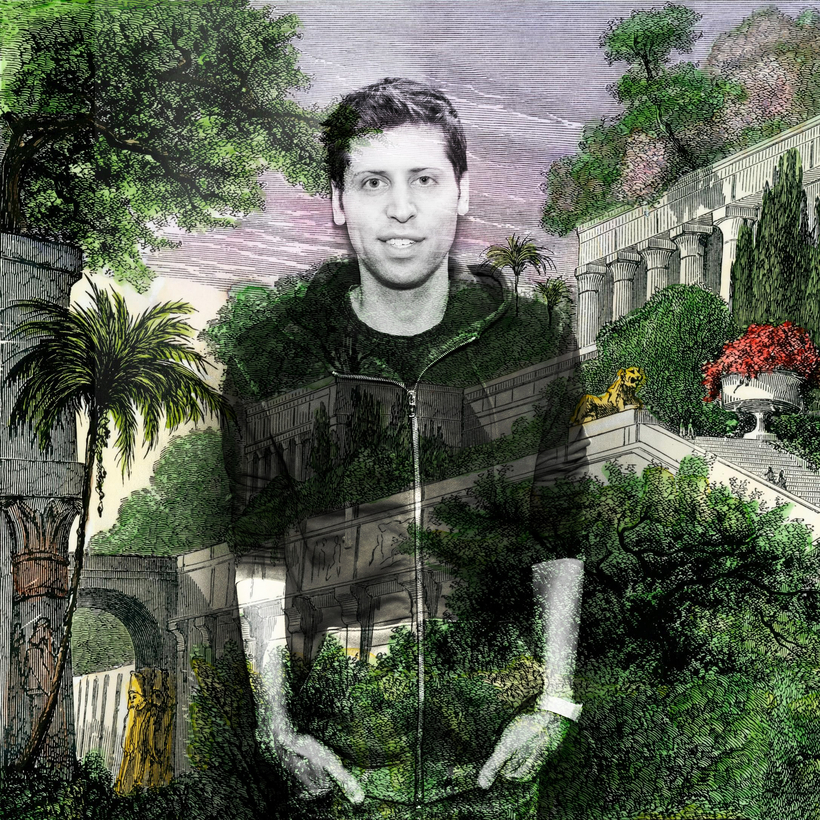About halfway through the second act of Doomers, Matthew Gasda’s new play, inspired by the ousting of Sam Altman from OpenAI, a camo-wearing think-tank blogger (played by Ira Gamerman) asks the corporate board a question: “Have you heard about the gardener of Babylon?”
“His pride was a tree that bore fruit of pure knowledge,” the blogger continues. “But the tree began to grow uncontrollably, its branches reaching the heavens.... The tree’s roots broke through the garden walls, and soon people came from everywhere to taste its fruit. The garden became a forest, and the gardener realized he was no longer in control—just another wanderer in the woods of his own making.”

In typical Gasda fashion, the next line is a lowbrow jab from a coquettish twentysomething (Agnes Enkhtamir) who dismisses the heady orator as a crank. The Mesopotamian gardener, we learn, didn’t really exist, not even in mythology; he was the invention of the company’s software, MindMesh, which the blogger had asked to produce a myth that explains their predicament.
But even as the plume of wonderment is washed away, something lingers. Because in this strange combination of ancient symbols, assembled from sources such as the Tower of Babylon and Ecclesiastes, the A.I. seems to have captured something about the syncretic style of our new machines that’s at once deeply disturbing and profound.
It’s disturbing because the myth works. The logic is sound, the point clear: that we’re building, in artificial general intelligence, or A.G.I., a Frankenstein-like monster that no human can possibly hope to contain. And it’s profound for the same reasons: because the so-called computing super-organism is being constructed from human materials and yet it’s somehow just … different.
The garden myth is both an ode to our new thinking partners and a warning, an epistemological mirror, much like the play itself. As if to prove the point, Gasda told me after the show how the garden myth was written: with the help of the “real” MindMesh, ChatGPT, credited in the program as a “dramaturge.”
But this isn’t just a play about technology. It’s a play about humans and their hubris: the delusions of grandeur that drive our techno-lords, the manic drive and ruthlessness that underpins their visions of global conquest. While Gasda’s first work of public notoriety, Dimes Square, centered on the lives of a group of extremely online edgelords in downtown New York City, Doomers is set in Silicon Valley and populated by another variety of narcissist, only with money and power.

Instead of cigarettes and coke, it’s ketamine and mushrooms. Instead of wine from the bottle, it’s Celsius and boba. Dimes Square described our moment as “the dumbest time in history.” Doomers’ appraisal might be more like: this is the moment before we all just fade into irrelevance.
ChatGPT is credited in the program as a “dramaturge.”
The play is structured in two acts, the first of which centers on the war room of our Sam Altman–like antihero, Seth (Sean Lynch), and his team of flunkies, sympathizers, and “corporate ethicists,” attempting to coax from him a non-destructive vision of the future.
The second act is an emergency meeting of the company’s board, led by an ex-N.S.A. agent (Alexandra Gambee) and filled with a mixture of useful pawns and cynical tech bros. We watch them turn against each other, contemplating everything from the probability of human extinction at the hands of our new tools (“p-doom”) to what one character calls the “most likely” outcome for the human-like super-intelligence: that it becomes “a very expensive pornbot.” As the cynical venture capitalist in the room (Paul Felten), who delivered an especially strong performance, puts it, “A polycule divided against itself cannot stand.”
Gasda’s particular talent as a playwright is for capturing the vocal mannerisms of hyper-intellectual insiders too caught up in their own psychodramas to realize the inanity of their own words. In Doomers, this gift is on full display, elegantly seesawing between corporate-speak, dick jokes, and meditations on the meaning of life.
The play successfully captures the ahistoricism, cultural nihilism, and technical wizardry of our generation’s most esteemed “revolutionaries.” But instead of treating them as character binaries—good or evil, rational or mad—it makes sense of their drive in ways familiar, if not equally terrifying and banal.
Alina, the “corporate ethicist” (Zsuzsa Magyar), suggests to Seth in the first act, “You make it sound like we’re building a genie in a bottle.” His retort: “What, are you anti-magic powers?” In its base simplicity and child-like appeal, it works as a decent retort to any would-be critic of our newest thinking partners and the people building them. Who among us is against magic?
Doomers is running now through April 19 at the Brooklyn Center for Theatre Research and artXnyc in New York City, and at the Pallas Gallery, in San Francisco, from March 6 to 22
Sam Venis is a Canadian writer based in Brooklyn. You can read his Substack here

